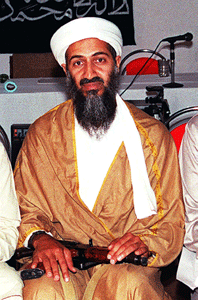The Man Who Would Be Messiah
By Sairah Irshad Khan | News & Politics | Published 14 years ago

They seek him here
They seek him there
The [Yankees] seek him everywhere
Is he in heaven
Or is he in hell
The demmed elusive Pimpernel
– (with apologies to Baroness Orczy)
Well now we know. The most wanted man on earth was right in our backyard, apprehended and decimated in a brisk 40-minute raid after a decade-long, possibly the most intense, and certainly the most publicised manhunt in recent history.
As global terrorism replaced AIDS as the scourge of the 20th century, a shadowy figure began to emerge as its very embodiment. But to all who knew him, Osama bin Laden, an industrial magnate of Yemeni extraction and Saudi nationality, a man responsible for murder, mayhem and the potential to ignite a doomsday-like conflagration, was overtly the very antithesis of violence.
His one-time Sudanese friend al Turabi remembers him as “gentle… never aggressive.” And award-winning journalist and veteran Al-Qaeda watcher Rahimullah Yusufzai, who interviewed him in 1998, says he was “soft-spoken… shy and mild-mannered, with delicate hands.” “Self-effacing,” “ordinary and forgettable” and “distinctly uncharismatic” are terms other people who met him use to describe bin Laden.
Certainly, even with his imposing six-and-a-half foot height, flowing robes and hair, he was no rock star. Yet, he must have harboured some compelling quality which allowed him to commandeer a vast, inchoate band of Islamic zealots scattered around the globe into one of the most lethal armies on earth. And its ranks swelled each day, with the induction of one, maybe two generations of men, plucked largely from that mass of impoverished, disenfranchised Muslims, or just lost youth, who needed an ideology that would give their wretched lives some meaning. The one Osama bin Laden offered promised salvation, replete with wine, women and song — in the hereafter, if not the here. It was an ideology they would gladly kill — or die for.
For western civilisation, Osama bin Laden was an incalculable, mystifying apparition: he was a man born into wealth and status, who chose instead exile, combat and a life on the run. A man used to sleeping on silken sheets, opting to rough it in the wilds and caves of time-warped tribal territories. And a man who controlled a force of men with the planet’s arguably most primitive mindset, through the most sophisticated, state-of-the-art technology.
Early mentions of bin Laden in publications such as National Geographic paint a somewhat romanticised picture (accompanied by equally romantic images) of a man who went from urbane college grad (he had a degree in civil engineering from the King Abdul Aziz University in Jeddah) to rebel with a cause.
In the early ’80s he became a mujahideen in the Afghan war against the USSR, and thereby an ally of the US for a common cause, and along the way established the Maktab-al-Khadamat (MAK), an organisation which funded and supplied arms to fighters engaged in battling the Red Army. Subsequently he distanced himself from the MAK and founded Al Qaeda.
The Afghan War aside, by now it was becoming evident to those who met him, that bin Laden was increasingly developing a distaste for the institution of monarchy, beginning with the one in place in Saudi Arabia, and an antipathy for US and western imperialism.
Even so, until then he was seen more as an angry young Hotspurian kind of character than as a global menace. But the 1990/91 deployment of American troops in Saudi Arabia proved the watershed. Bin Laden declared war on all those responsible for what he saw as the desecration of the Holy Land, and was thereafter expelled to Sudan. Perceptions of him now began to register a paradigm shift.
As bombs started exploding in US embassies around the world and strategic western installations began being targeted, Osama bin Laden’s name started to ring alarm bells in the corridors of power in western states. And for those with imagination — or those of a certain persuasion — he began to acquire an uncanny resemblance to Nostradamus’s third “anti-Christ” (after Hitler and Napoleon according to subscribers to the predictions) and the “King of Terror” who Nostradamus wrote would wreak havoc as he rained death and destruction on the “New City.”
Drawing from that, a 1981 documentary on Nostradamus, narrated by Orson Welles, predicted that in 1999 “a Muslim fanatic” would launch a “devastating attack on Manhattan.”
The film proved to be the chronicle of a prophecy foretold. Two years after the predicted date, a Muslim fanatic did just that, recharting borders and the course of history.
Will bin Laden’s legacy endure? No texts with a blueprint for his organisation for the future ascribed to him have surfaced so far. All that has reportedly emerged in writing from the man who would be messiah is a will apologising to his children for not spending adequate time with them and asking them not to enlist in Al Qaeda, added to an admonition to his many, many wives (the youngest among them barely 30, if that), never to remarry.


